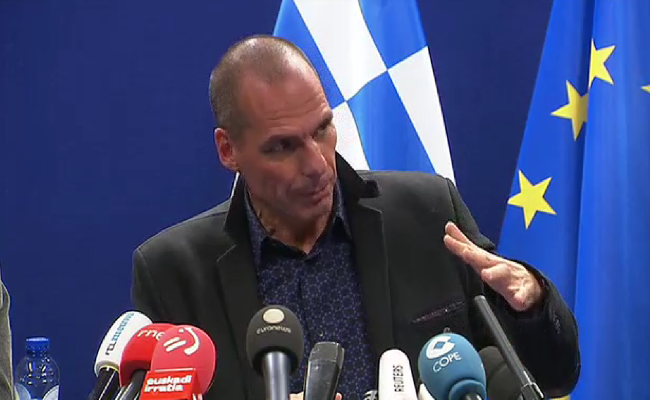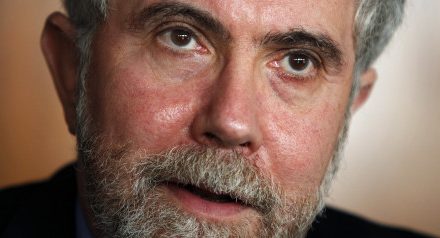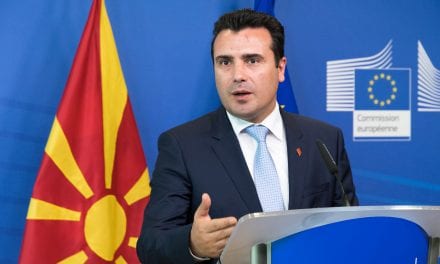by Shawn Tully, Fortune
Economist James Galbraith recently spent a week with Greek finance minister Yanis Varoufakis. He shares with Fortune what he learned while looking at the nation’s fiscal crisis from the inside.
Is Greece’s fate in the hands of Angela Merkel? One leading economist with close ties to Greek finance minister Yanis Varoufakis says that the primary obstacle to compromise is a dramatic division within the German government, with one faction demanding that Greece fully adhere to its previous commitments, and another powerful group advocating compromise.
“It’s all up to Merkel,” says James Galbraith, who spent seven days in mid-February at Varoufakis’ side in Brussels and Athens. “We’ve heard from her finance minister, who takes a negative stance, and from her vice chancellor, who wants to talk. The person we haven’t heard from is Merkel. We know she does not talk until needed. They are as tough as possible, then make one concession at the last minute so they don’t have to make two.”
Galbraith summarizes Merkel’s dilemma—and the best hope for an agreement—with one fundamental question: “Does Merkel want to be the person who presides over the fragmentation of the Eurozone?”
It’s hard to imagine a more unlikely duo than Galbraith and Varoufakis. The former is the Harvard, Yale and Cambridge-educated son of legendary economist John Kenneth Galbraith. Varoufakis is a firebrand who sports leather trench coats and electric blue shirts at meetings with Europe’s stuffy elites, and blasts off on motorcycles to unwind. Yet as colleagues at the University of Texas in Austin, they became not only great friends but intellectual soul mates, co-authoring (along with UK economist Stuart Holland) a 2013 treatise on resolving the Eurozone crisis that advocated for replacing large portions of troubled nations’ sovereign debt with super-safe ECB-backed bonds carrying low interest rates. It’s clear that Galbraith’s ideas helped shape Varoufakis’ controversial campaign to end “austerity” in Greece and protect government jobs and pensions.
Working alongside Varoufakis, Galbraith got an inside view of the chaotic maneuvering at a Eurogroup meeting of European finance ministers, held on February 16 in Brussels. “I stayed with the tech teams, from the 11th to the 17th, including the Brussels meeting,” says Galbraith. “I was in the boiler room with the Greek guys, the working stiffs.”
At the Eurogroup conclave, Pierre Moscovici, the EU commissioner for economic and financial affairs, presented Varoufakis with a draft communiqué that allowed Greece to apply for an extension of its loan agreement while granting time to discuss a new growth program for Greece. As Varoufakis stated at the press conference after the meeting, he was poised to sign the Moscovici communiqué, which he praised as a “splendid document” and a “genuine breakthrough.”
But the chief of the Eurogroup, Jeroen Dijsselbloem, was working on his own document. “Yanis said, ‘I have a text,’ and Dijesselbloem said, ‘No, this is the text.’”
Galbraith and the Greek team then attempted to combine portions of the two drafts into a document acceptable to both sides. “My day from that point, along with some other people, was taken up with trying to turn either of those texts into something that could be signed. In another half hour, we could have done it.”
Then, according to Galbraith, German finance minister Wolfgang Schaeuble closed the meeting. “He was saying ‘no’” to fashioning a joint statement as a prelude to a compromise, says Galbraith.
For Galbraith, the lack of coordination on the European side was shocking. “I’m an old Congressional staffer,” he says. “To watch an official body function in this slipshod and ad hoc way, to watch the Eurogroup and the way things were done, was really a revelation.”
On February 18, Varoufakis presented a formal request for an extension of Greece’s loan agreement with the Eurogroup. Once again, the divergent responses left Galbraith confounded.
“Jean-Claude Juncker [president of the European Commission] said it was a good start,” says Galbraith. He also notes that Germany’s vice chancellor, Sigmar Gabriel, said that the loan extension letter was a “starting point” for negotiations. But Schaeuble contradicted Gabriel, dismissing the request as “not a substantial position.”
“My eyes are bugging out watching this,” says Galbraith. “This is Germany, the most powerful government in Europe!”
For Galbraith, the divisions in Germany, and among the nations themselves, have made it clear that the European leadership are poor negotiators. “They made the mistake of exposing to Yanis that they are playing a very hard game, but not playing it very well, from the point of view of basic political skills.” He dismisses the idea that the Greek position is confusing. “I think the Europeans want to pretend to be confused, but the confusion exists in their minds, not in the Greek position.”
For Varoufakis and Galbraith, petty politics is trumping sound economics. “The institutional players—the IMF, European Community, and ECB—have been constructive,” says Galbraith. “But the creditors, the active players, are the finance ministers, and they are divided and hostile.”
The camp strongly opposed to compromise includes Spain, Portugal, and Finland. “Their leaders all facing elections with rising opposition,” Galbraith says. “They’re terrified that their opponents will take heart from the Greek position.” Hence, surviving in office means more than saving the Eurozone.
Breaking the impasse will most likely require the intervention of the only leader powerful enough to pull off such a maneuver: Angela Merkel.
Through all the turmoil, Galbraith’s admiration for his friend Varoufakis has only increased. While many argue that Varoufakis’ unorthodox wardrobe and provocative statements—remarking that the reform agreement amounts to “financial waterboarding,” for example—are antagonizing Europe’s financial establishment, Galbraith says that fellow ministers should welcome him as a rare truth-teller. “His honesty, clarity, and erudition are quite unknown in European circles, so I’m sure it’s quite a shock to experience him for the first time,” he says.
As an example of Varoufakis’ unvarnished honesty, he cites his friend’s statement that among those with whom he’s negotiated, Schaeuble, a staunch opponent, is “the only one whom I have found to have intellectual substance.”
After the depressing experiences in Brussels, Galbraith found the mood in Athens exhilarating. “Just three to six months ago, it was totally depressing. Now there’s a complete change of mood; the sense of pride is restored,” he says.
No one symbolizes that new optimism better than Varoufakis. “We walked together from the ministry to the Parliament nearby, and it’s an experience,” marvels Galbraith. “People in cars roll down their windows to shake his hand, bus drivers stop to salute him, he’s surrounded by kids in the streets.” Varoufakis even stopped for five minutes to reassure a cleaning lady looking for work, his hand on her elbow. “He’s as much of a star as Alexis Tsipras [Greece’s new prime minister],” says Galbraith.
Will Varoufakis fold to keep Greece in the Euro by dropping the growth platform that got the new government elected in the first place? “That’s impossible,” says Galbraith. “He’d get on his motorcycle and drive off. He gnashed his teeth to take the job. He wanted to put his ideas into practice.”
Europe’s finance ministers have never witnessed anything like Varoufakis. Merkel will need to decide if compromising with someone regarded as this radical and outrageous is really an option. The Euro’s future may hang in the balance.



















